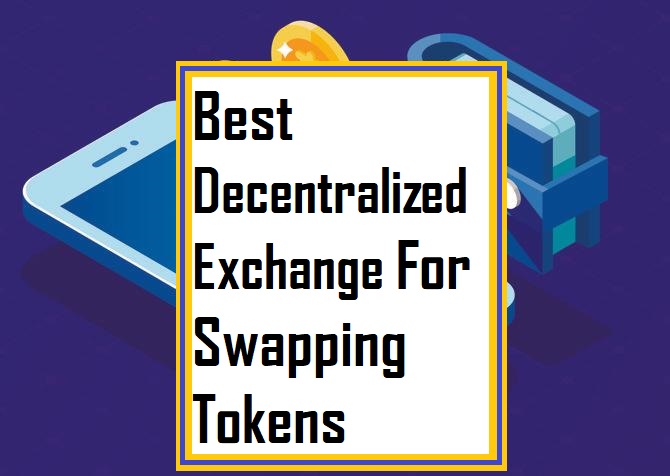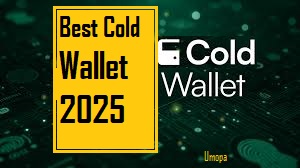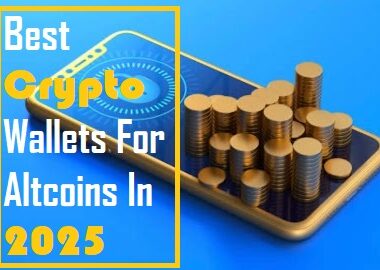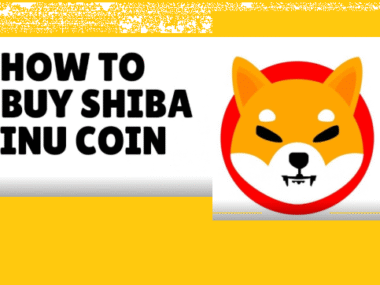The world of Decentralized Finance (DeFi) has gained significant momentum in recent years, offering users the ability to swap tokens, lend, borrow, and engage in a range of financial activities without relying on traditional banks or centralized exchanges. One of the primary tools for engaging in DeFi is a decentralized exchange (DEX).
DEXs allow users to trade tokens directly from their wallets, maintaining control over their funds and ensuring a higher level of privacy and security. Unlike centralized exchanges (CEXs), which are governed by a central authority, DEXs are powered by smart contracts on the blockchain, facilitating peer-to-peer trading without the need for intermediaries.
In this article, we will explore the best decentralized exchanges for swapping tokens in 2025. We will look at the features, advantages, and use cases for the most popular DEXs available today, helping you choose the best platform for your token swapping needs.
What is a Decentralized Exchange (DEX)?
A decentralized exchange (DEX) is a peer-to-peer platform that allows users to trade cryptocurrencies directly with each other, without the involvement of a central authority. The trades are executed through smart contracts—self-executing contracts with the terms of the agreement between buyer and seller directly written into code—on blockchain platforms like Ethereum, Binance Smart Chain (BSC), or Solana.
Some key features of DEXs include:
- Peer-to-peer trading: No middleman is required, meaning users retain control of their assets.
- Privacy and control: DEXs do not require personal information, and users are in control of their private keys.
- Liquidity pools: Liquidity providers can contribute funds to pools, earning a portion of the transaction fees in return.
- Lower fees: DEXs usually have lower trading fees compared to centralized exchanges due to the absence of a middleman.
DEXs allow for seamless token swapping, enabling you to exchange one cryptocurrency for another in a decentralized, secure, and fast environment.
Why Use a Decentralized Exchange for Swapping Tokens?
Swapping tokens through a decentralized exchange offers several advantages:
- Security: Since users retain control over their private keys and funds, there is no risk of centralized exchange hacks or issues related to withdrawal limits.
- Anonymity: DEXs don’t require KYC (Know Your Customer) procedures, ensuring greater privacy for users.
- Lower Fees: DEXs typically charge lower transaction fees because they do not have the overhead costs associated with maintaining a centralized platform.
- Access to More Tokens: Many DeFi tokens are only available on DEXs, and these exchanges often list tokens that aren’t supported by centralized platforms.
- Direct Control Over Funds: Unlike centralized exchanges, where users must deposit funds into the exchange, DEXs allow you to trade directly from your wallet, giving you full control of your assets at all times.
Best Decentralized Exchanges for Swapping Tokens in 2025
1. Uniswap: Best for Ethereum-Based Token Swaps
Uniswap is one of the most well-known decentralized exchanges and has become synonymous with token swaps on the Ethereum blockchain. It’s an automated market maker (AMM), which means it uses liquidity pools to facilitate trading rather than order books.
- Key Features:
- Ethereum-Based: Uniswap supports ERC-20 tokens, which are widely used in the DeFi ecosystem.
- Liquidity Pools: Users can provide liquidity to trading pairs and earn a share of transaction fees in return.
- No Order Books: Trading happens directly between users through smart contracts, avoiding the need for centralized order books.
- User Interface: Uniswap is known for its simple, user-friendly interface, making it easy for both beginners and experienced traders to use.
Pros:
- Supports a wide range of ERC-20 tokens
- Low fees compared to centralized exchanges
- Seamless user experience for token swapping
- Widely trusted and secure
Cons:
- Ethereum network fees can be high during periods of congestion
- Limited to Ethereum-based assets
2. SushiSwap: Best for DeFi Token Swapping
SushiSwap is a DeFi-focused DEX that was created as a fork of Uniswap. It offers many of the same features as Uniswap, but with additional benefits like yield farming, staking, and governance. SushiSwap is known for its user-friendly interface and advanced features for DeFi users.
- Key Features:
- Multi-Chain Support: SushiSwap now operates on multiple blockchains, including Ethereum, Binance Smart Chain (BSC), Polygon, and Fantom, enabling users to swap tokens across various ecosystems.
- Yield Farming and Staking: Users can stake their tokens or provide liquidity to earn SUSHI tokens as rewards.
- SushiSwap Analytics: SushiSwap offers robust analytics for traders to monitor token pairs, liquidity, and trading volume.
Pros:
- Multi-chain support for greater flexibility in token swapping
- Yield farming and staking opportunities
- Low transaction fees compared to centralized platforms
- Strong community governance and security
Cons:
- Liquidity may be lower than larger platforms like Uniswap
- Requires careful management of assets for yield farming and staking
3. PancakeSwap: Best for Binance Smart Chain (BSC) Token Swaps
PancakeSwap is the largest decentralized exchange on the Binance Smart Chain (BSC) and operates in a similar manner to Uniswap, using AMMs and liquidity pools to facilitate token swaps.
- Key Features:
- BSC-Based: PancakeSwap supports BEP-20 tokens on Binance Smart Chain, which allows for faster and cheaper transactions than on Ethereum-based platforms.
- Low Fees: PancakeSwap’s fees are significantly lower compared to Ethereum-based DEXs, making it an attractive option for traders looking for cost-effective swaps.
- Staking and Yield Farming: PancakeSwap offers opportunities to stake tokens and participate in yield farming, earning additional rewards on your assets.
Pros:
- Lower transaction fees than Ethereum-based DEXs
- Fast transaction speeds thanks to BSC
- Offers yield farming and staking rewards
- Great for swapping BEP-20 tokens
Cons:
- Limited to BEP-20 tokens
- Less liquidity compared to larger DEXs like Uniswap
4. 1inch: Best for Aggregating DEX Liquidity
1inch is a DEX aggregator, meaning it aggregates liquidity from multiple decentralized exchanges to provide the best price for users. Instead of relying on a single platform, 1inch finds the best rates for your trade by sourcing liquidity from a variety of DEXs.
- Key Features:
- Best Price Guarantee: 1inch automatically finds the best price across multiple DEXs for the tokens you want to swap.
- Multi-Chain Support: Supports tokens on multiple blockchains, including Ethereum, BSC, and Polygon.
- Slippage Reduction: The platform helps minimize slippage, which occurs when the price of a token changes between the time you place an order and the time it executes.
Pros:
- Aggregates liquidity from various DEXs to provide the best rates
- Lower slippage and reduced transaction costs
- Supports multiple blockchains, including Ethereum and BSC
Cons:
- More complex for beginners compared to standalone DEXs
- Relies on third-party liquidity, which can be lower than larger DEXs
5. Curve Finance: Best for Stablecoin Swapping
Curve Finance is a DeFi exchange specifically designed for stablecoin swaps, offering low-slippage and low-fee exchanges for assets like USDT, USDC, DAI, and other stablecoins.
- Key Features:
- Stablecoin-Specific: Curve Finance is optimized for swapping stablecoins and other assets with minimal slippage and fees.
- Liquidity Pools: Users can participate in liquidity pools with stablecoins to earn rewards while maintaining minimal price volatility.
- DeFi Integration: Curve Finance integrates with popular DeFi platforms and is often used for yield farming and staking stablecoins.
Pros:
- Optimized for stablecoin swaps
- Minimal slippage and fees for stable assets
- Strong DeFi integration and liquidity pools
Cons:
- Limited to stablecoins and fewer altcoins
- More specialized than general-purpose DEXs
How to Choose the Best DEX for Swapping Tokens
When selecting a DEX for token swapping, consider the following factors:
- Fees: Consider the transaction fees associated with the platform. PancakeSwap and SushiSwap are known for their low fees, especially on Binance Smart Chain (BSC).
- Token Availability: Ensure the DEX supports the tokens you wish to trade. Platforms like Uniswap and SushiSwap support a broad range of assets, while others like Curve Finance specialize in stablecoins.
- Liquidity: Liquidity is crucial for ensuring that your trades are executed at the best prices. Platforms like Uniswap and PancakeSwap tend to have higher liquidity than others.
- Security: Always use well-known and secure platforms. Uniswap, SushiSwap, and PancakeSwap are established platforms with robust security measures.
Best DEX for Token Swapping in 2025
In 2025, the best decentralized exchange for swapping tokens depends on your preferences. Uniswap remains a top choice for Ethereum-based tokens, while PancakeSwap offers low fees and fast transactions on Binance Smart Chain.
For those who want to ensure the best prices, 1inch is an excellent choice for aggregating liquidity across multiple platforms. If you’re focused on stablecoin swaps, Curve Finance provides the most efficient trading environment.
Regardless of the DEX you choose, always prioritize security, fees, and liquidity to ensure that you’re getting the best value for your token swaps.










